初中英语外研(新标准)版九年级下Module7English for you and meUnit3Language in use课件(共31张PPT)
文档属性
| 名称 | 初中英语外研(新标准)版九年级下Module7English for you and meUnit3Language in use课件(共31张PPT) |
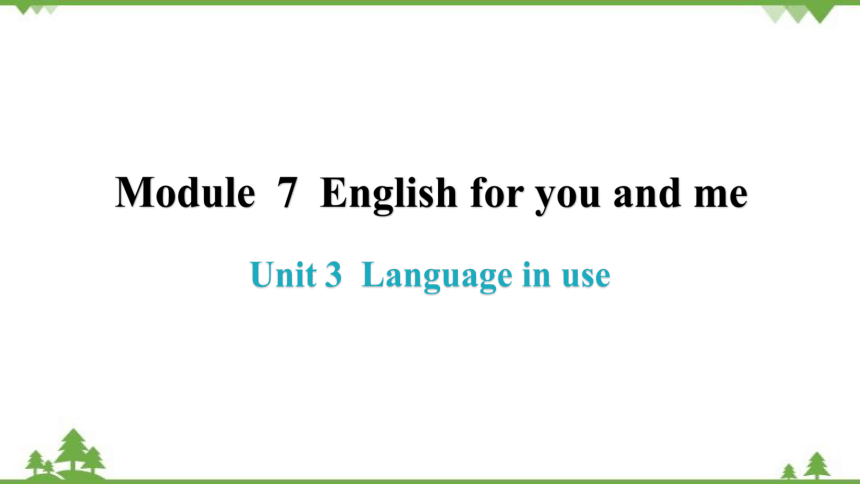
|
|
| 格式 | pptx | ||
| 文件大小 | 131.5KB | ||
| 资源类型 | 教案 | ||
| 版本资源 | 外研版 | ||
| 科目 | 英语 | ||
| 更新时间 | 2022-06-20 06:51:26 | ||
图片预览


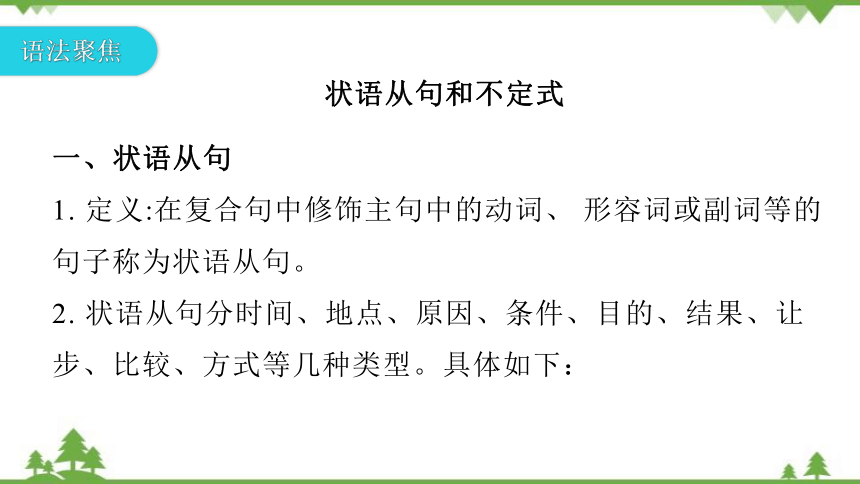
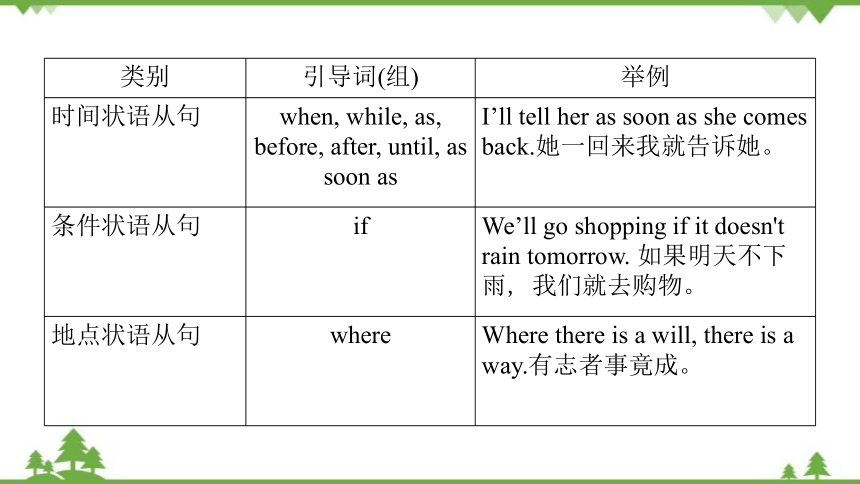
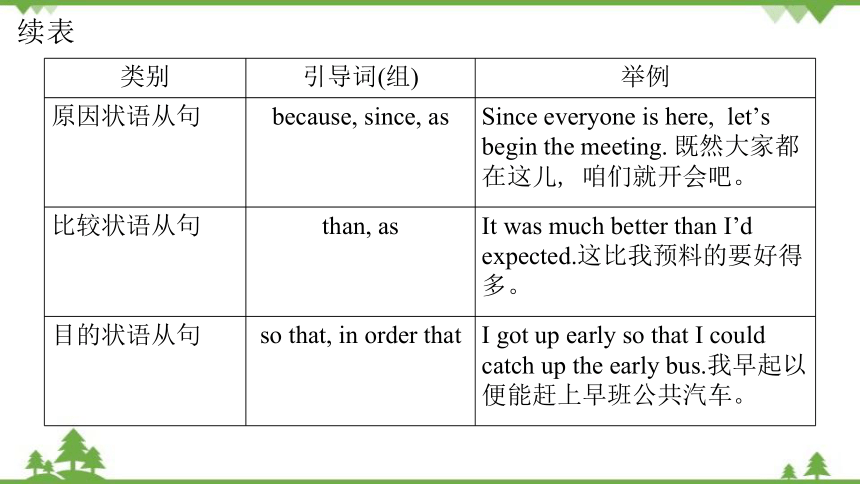
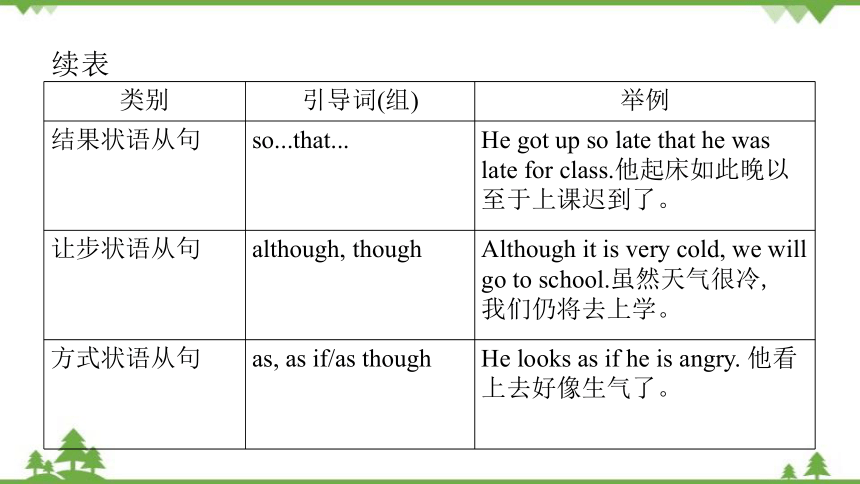
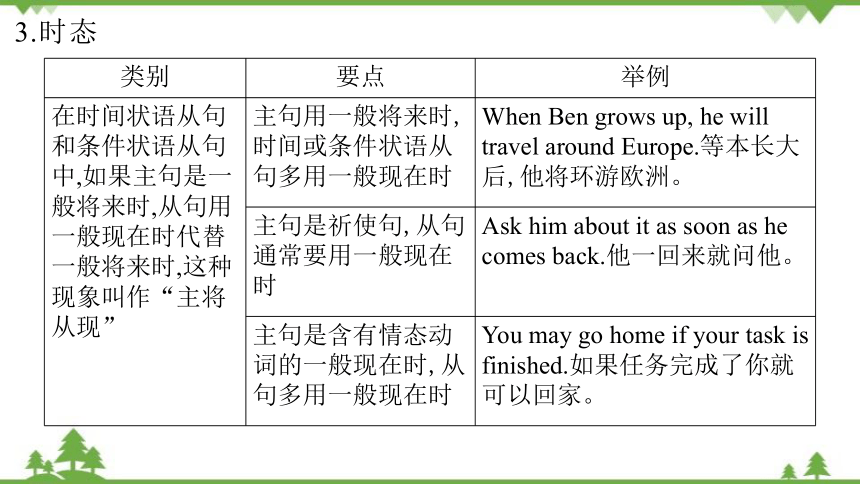
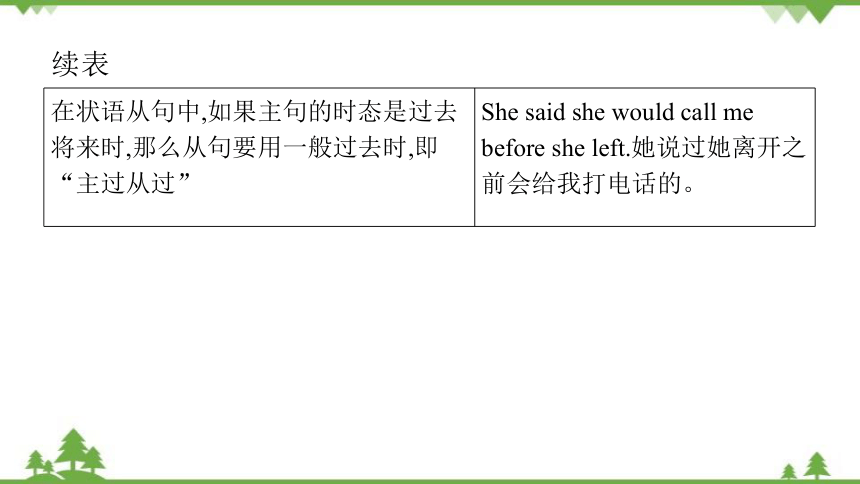
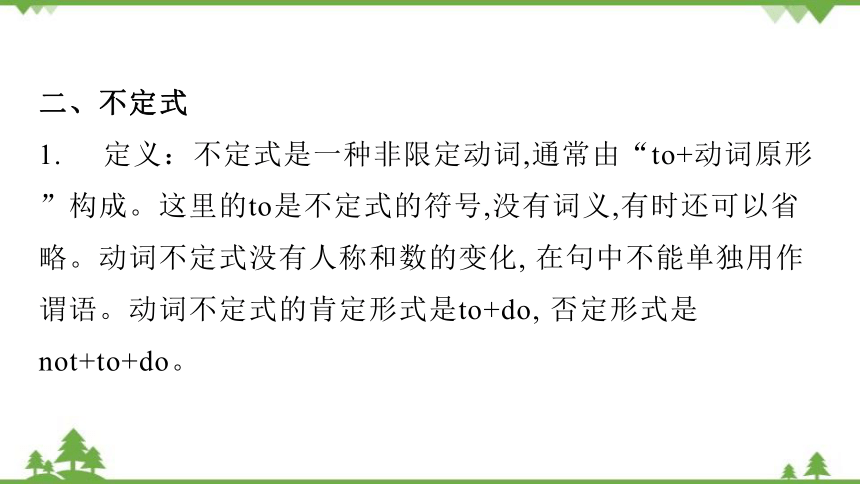

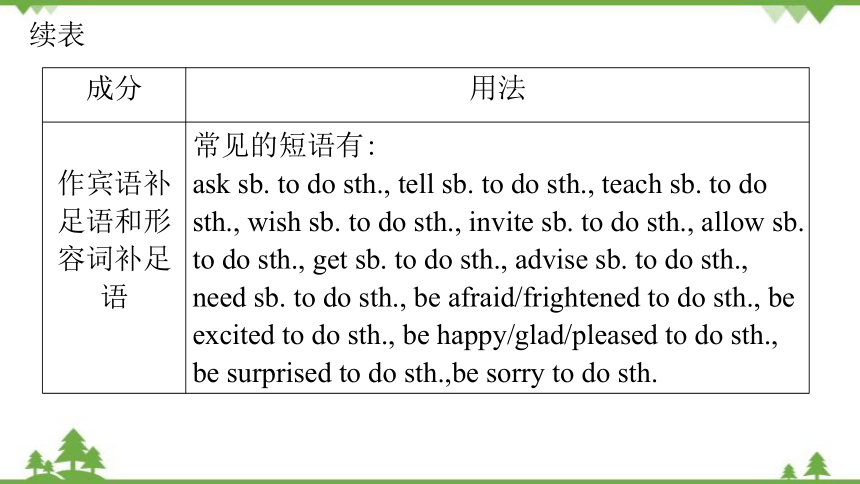

文档简介
(共31张PPT)
Module 7 English for you and me
Unit 3 Language in use
目录
语法聚焦
01
课堂小测
02
语法聚焦
状语从句和不定式
一、状语从句
1. 定义:在复合句中修饰主句中的动词、 形容词或副词等的句子称为状语从句。
2. 状语从句分时间、地点、原因、条件、目的、结果、让步、比较、方式等几种类型。具体如下:
类别 引导词(组) 举例
时间状语从句 when, while, as, before, after, until, as soon as I’ll tell her as soon as she comes back.她一回来我就告诉她。
条件状语从句 if We’ll go shopping if it doesn't rain tomorrow. 如果明天不下雨, 我们就去购物。
地点状语从句 where Where there is a will, there is a way.有志者事竟成。
类别 引导词(组) 举例
原因状语从句 because, since, as Since everyone is here, let’s begin the meeting. 既然大家都在这儿, 咱们就开会吧。
比较状语从句 than, as It was much better than I’d expected.这比我预料的要好得多。
目的状语从句 so that, in order that I got up early so that I could catch up the early bus.我早起以便能赶上早班公共汽车。
续表
类别 引导词(组) 举例
结果状语从句 so...that... He got up so late that he was late for class.他起床如此晚以至于上课迟到了。
让步状语从句 although, though Although it is very cold, we will go to school.虽然天气很冷, 我们仍将去上学。
方式状语从句 as, as if/as though He looks as if he is angry. 他看上去好像生气了。
续表
类别 要点 举例
在时间状语从句和条件状语从句中,如果主句是一般将来时,从句用一般现在时代替一般将来时,这种现象叫作“主将从现” 主句用一般将来时,时间或条件状语从句多用一般现在时 When Ben grows up, he will travel around Europe.等本长大后,他将环游欧洲。
主句是祈使句,从句通常要用一般现在时 Ask him about it as soon as he comes back.他一回来就问他。
主句是含有情态动词的一般现在时,从句多用一般现在时 You may go home if your task is finished.如果任务完成了你就可以回家。
3.时态
在状语从句中,如果主句的时态是过去将来时,那么从句要用一般过去时,即“主过从过” She said she would call me before she left.她说过她离开之前会给我打电话的。
续表
二、不定式
1. 定义:不定式是一种非限定动词,通常由“to+动词原形”构成。这里的to是不定式的符号,没有词义,有时还可以省略。动词不定式没有人称和数的变化, 在句中不能单独用作谓语。动词不定式的肯定形式是to+do, 否定形式是not+to+do。
2.用法
成分 用法
作主语 不定式可以直接作主语。但在英语中,常用it作形式主语,真正的主语即动词不定式放在后面。如:
It isn't right to kill whales for their meat. = To kill whales for their meat isn't right.为了鲸鱼的肉而杀害它们是不对的。
作宾语 常置于一些动词后作宾语。常见的可接不定式作宾语的动词有want, hope, like, begin, start, try, need, forget, remember, agree, learn, help, decide, manage, continue, stop, plan, offer, love等
续表
成分 用法
作宾语补足语和形容词补足语 常见的短语有:
ask sb. to do sth., tell sb. to do sth., teach sb. to do sth., wish sb. to do sth., invite sb. to do sth., allow sb. to do sth., get sb. to do sth., advise sb. to do sth., need sb. to do sth., be afraid/frightened to do sth., be excited to do sth., be happy/glad/pleased to do sth., be surprised to do sth.,be sorry to do sth.
续表
成分 用法
作状语 表示目的或原因等, 可以放在句末, 也可以放在句首。如:He got up early to catch the plane to Shanghai.他早起是为了赶上去上海的飞机。
Our government is working hard to save pandas.我们的政府正在努力采取措施去挽救熊猫。
作定语 修饰名词或代词, 起形容词的作用, 在句中作定语, 放在被修饰对象的后面, 一般是表示物体的用途或者要做的事等。如:I have a lot of homework to do.我有许多家庭作业要做。Give me something to eat, please.请给我一点儿吃的东西。
续表
成分 用法
作表语 常位于系动词的后面,表示主语的具体内容、目的等。如:The best way is to read the play before you see it. 最好的方法是在你看这个话剧之前先读一读它。
不带to的不定式作宾补 有些动词后常接省略to的不定式作宾语补足语, 常见的此类动词有:feel, hear, let, make, see, watch, notice, help;但在被动语态中, 作宾语补足语的不定式中的不定式符号to不能省略(let除外)。这些动词后也可接现在分词, 表示动作正在进行。如:I often hear him sing.我经常听见他唱歌。I hear him singing.我听见他正在唱歌。He is often heard to sing.他经常被听见在唱歌。
续表
成分 用法
不带to的不定式作宾补 注意:
①有些动词后只能接动名词。常见的有:finish, enjoy, practise, avoid, mind, suggest等。如:She has just finished reading the book.她刚读完这本书。
②有些动词后既可接不定式也可接动名词, 但表达的意思差别很大。
常见的有:remember, forget, stop等, 接不定式时表示要做的事, 接动名词时表示做过的事。如:I remembered seeing you before. 我记得从前见过你。I'll remember to see you tomorrow. 我会记得明天去看你。
3. 一些常见的不定式句型
(1)Sth. + be + adj. + to do.
This question is difficult to answer.这个问题很难回答。
These apples are not good to eat.这些苹果不宜吃。
(2)It is time to do sth.
It is time to go to school.到去上学的时间了。
(3)It takes sb. some time to do sth.
It takes me 5 minutes to go to school.去上学花费我五分钟的时间。
(4)特殊疑问词+不定式
Do you know what to do next 你知道下一步要做什么吗
课堂小测
一、根据句意及首字母提示,用单词的适当形式填空,每空一词
1. Everyone hopes they can ________ their dreams.
2. There were three storeys(楼层), __________ the ground floor.
3. Not all _________ come from India. Some can be from other countries like America.
achieve
including
Indians
4. While in Italy, she is always alone because she knows little
__________.
5. It's not enough to learn only one ________ language if you want to work internationally.
Italian
foreign
二、找出下列句子的错误, 并在横线上进行更正
6. Many people think that possible for Chinese to become as common as English.
________________________________________________
7. People learn a common language communicating with
each other better.
_______________________________________________
that改为it
communicating with改为to communicate with
8. Because she practises playing the guitar hard, so she becomes a known guitarist.
_________________________________________________
9. Put the shared bikes in the right place in order to they can be used conveniently.
_________________________________________________
Because she改为She或去掉so
in order to改为in order that
10. If an enemy is trying whatever he can help you, there must be a reason.
__________________________________________________
help 改为to help
三、单项填空(语法专练)
( )11. The nurse won’t leave her patients _______ she’s sure they’re all taken good care of.
A. unless B. because
C. since D. if
( )12. —Did you catch the early bus this morning
—Yes. The bus started to move _______ I got on it.
A. though B. before
C. as soon as D. as if
A
C
( )13. _______ I do, I do it for you. Do not ever doubt that, my boy.
A. Whatever B. Wherever
C. Whenever D. Whoever
( )14. We advise parents _______ their children at home alone in order to keep them away from danger.
A. not to leave B. not leave
C. not leaving D. not to leaving
A
A
( )15. Never put off _______ tomorrow what you can do today.
A. until B. before
C. when D. as
A
语法选择
Tom hated grammar. It was a hot afternoon and he ___16___ sleepy in his English class. It was a grammar lesson. He wanted to leave school and play. Tom looked out of the window. He looked at the trees and flowers. Then he started daydreaming.
After ten minutes the teacher stopped speaking. He asked the students ___17___ some grammar exercises. The students took out ___18___ exercise books and pencils and they
started writing. The teacher looked at Tom. He saw that he wasn't writing, so he said,“___19___ aren't you writing,Tom ”
“What, sir ” Tom said.
“___20___. Don't have a daydream,Tom!” the teacher said ___21___,“Why aren't you writing ”
Tom thought for a moment and replied,“I aren't got ___22___ pencil.”
The teacher looked at Tom and said,“You aren't got a pencil You mean you don't have a pencil ”
Tom didn’t understand the English teacher, ___23___ he said,“Sorry, sir.”
The teacher said ___24___ an angry voice,“I don’t have a pencil. He doesn’t have a pencil. She doesn’t have a pencil. We don’t have pencils. They don’t have pencils. Tom, ___25___ you understand ”
Tom thought for a while and he said,“My goodness! What happened to all the pencils, sir ”
( )16. A. was feeling B. felt
C. feel D. has felt
( )17. A. do B. did
C. to do D. done
( )18. A. their B. them
C. theirs D. they
( )19. A. When B. How
C. What D. Why
A
C
A
D
( )20. A. Waked up B. Waking up
C. Wake up D. To wake up
( )21. A. aloud B. loud
C. loudness D. loudly
( )22. A. a B. an
C. / D. the
( )23. A. because B. when
C. while D. so
C
D
A
D
( )24. A. in B. on
C. to D. off
( )25. A. are B. does
C. did D. do
A
D
课后作业
Module 7 English for you and me
Unit 3 Language in use
目录
语法聚焦
01
课堂小测
02
语法聚焦
状语从句和不定式
一、状语从句
1. 定义:在复合句中修饰主句中的动词、 形容词或副词等的句子称为状语从句。
2. 状语从句分时间、地点、原因、条件、目的、结果、让步、比较、方式等几种类型。具体如下:
类别 引导词(组) 举例
时间状语从句 when, while, as, before, after, until, as soon as I’ll tell her as soon as she comes back.她一回来我就告诉她。
条件状语从句 if We’ll go shopping if it doesn't rain tomorrow. 如果明天不下雨, 我们就去购物。
地点状语从句 where Where there is a will, there is a way.有志者事竟成。
类别 引导词(组) 举例
原因状语从句 because, since, as Since everyone is here, let’s begin the meeting. 既然大家都在这儿, 咱们就开会吧。
比较状语从句 than, as It was much better than I’d expected.这比我预料的要好得多。
目的状语从句 so that, in order that I got up early so that I could catch up the early bus.我早起以便能赶上早班公共汽车。
续表
类别 引导词(组) 举例
结果状语从句 so...that... He got up so late that he was late for class.他起床如此晚以至于上课迟到了。
让步状语从句 although, though Although it is very cold, we will go to school.虽然天气很冷, 我们仍将去上学。
方式状语从句 as, as if/as though He looks as if he is angry. 他看上去好像生气了。
续表
类别 要点 举例
在时间状语从句和条件状语从句中,如果主句是一般将来时,从句用一般现在时代替一般将来时,这种现象叫作“主将从现” 主句用一般将来时,时间或条件状语从句多用一般现在时 When Ben grows up, he will travel around Europe.等本长大后,他将环游欧洲。
主句是祈使句,从句通常要用一般现在时 Ask him about it as soon as he comes back.他一回来就问他。
主句是含有情态动词的一般现在时,从句多用一般现在时 You may go home if your task is finished.如果任务完成了你就可以回家。
3.时态
在状语从句中,如果主句的时态是过去将来时,那么从句要用一般过去时,即“主过从过” She said she would call me before she left.她说过她离开之前会给我打电话的。
续表
二、不定式
1. 定义:不定式是一种非限定动词,通常由“to+动词原形”构成。这里的to是不定式的符号,没有词义,有时还可以省略。动词不定式没有人称和数的变化, 在句中不能单独用作谓语。动词不定式的肯定形式是to+do, 否定形式是not+to+do。
2.用法
成分 用法
作主语 不定式可以直接作主语。但在英语中,常用it作形式主语,真正的主语即动词不定式放在后面。如:
It isn't right to kill whales for their meat. = To kill whales for their meat isn't right.为了鲸鱼的肉而杀害它们是不对的。
作宾语 常置于一些动词后作宾语。常见的可接不定式作宾语的动词有want, hope, like, begin, start, try, need, forget, remember, agree, learn, help, decide, manage, continue, stop, plan, offer, love等
续表
成分 用法
作宾语补足语和形容词补足语 常见的短语有:
ask sb. to do sth., tell sb. to do sth., teach sb. to do sth., wish sb. to do sth., invite sb. to do sth., allow sb. to do sth., get sb. to do sth., advise sb. to do sth., need sb. to do sth., be afraid/frightened to do sth., be excited to do sth., be happy/glad/pleased to do sth., be surprised to do sth.,be sorry to do sth.
续表
成分 用法
作状语 表示目的或原因等, 可以放在句末, 也可以放在句首。如:He got up early to catch the plane to Shanghai.他早起是为了赶上去上海的飞机。
Our government is working hard to save pandas.我们的政府正在努力采取措施去挽救熊猫。
作定语 修饰名词或代词, 起形容词的作用, 在句中作定语, 放在被修饰对象的后面, 一般是表示物体的用途或者要做的事等。如:I have a lot of homework to do.我有许多家庭作业要做。Give me something to eat, please.请给我一点儿吃的东西。
续表
成分 用法
作表语 常位于系动词的后面,表示主语的具体内容、目的等。如:The best way is to read the play before you see it. 最好的方法是在你看这个话剧之前先读一读它。
不带to的不定式作宾补 有些动词后常接省略to的不定式作宾语补足语, 常见的此类动词有:feel, hear, let, make, see, watch, notice, help;但在被动语态中, 作宾语补足语的不定式中的不定式符号to不能省略(let除外)。这些动词后也可接现在分词, 表示动作正在进行。如:I often hear him sing.我经常听见他唱歌。I hear him singing.我听见他正在唱歌。He is often heard to sing.他经常被听见在唱歌。
续表
成分 用法
不带to的不定式作宾补 注意:
①有些动词后只能接动名词。常见的有:finish, enjoy, practise, avoid, mind, suggest等。如:She has just finished reading the book.她刚读完这本书。
②有些动词后既可接不定式也可接动名词, 但表达的意思差别很大。
常见的有:remember, forget, stop等, 接不定式时表示要做的事, 接动名词时表示做过的事。如:I remembered seeing you before. 我记得从前见过你。I'll remember to see you tomorrow. 我会记得明天去看你。
3. 一些常见的不定式句型
(1)Sth. + be + adj. + to do.
This question is difficult to answer.这个问题很难回答。
These apples are not good to eat.这些苹果不宜吃。
(2)It is time to do sth.
It is time to go to school.到去上学的时间了。
(3)It takes sb. some time to do sth.
It takes me 5 minutes to go to school.去上学花费我五分钟的时间。
(4)特殊疑问词+不定式
Do you know what to do next 你知道下一步要做什么吗
课堂小测
一、根据句意及首字母提示,用单词的适当形式填空,每空一词
1. Everyone hopes they can ________ their dreams.
2. There were three storeys(楼层), __________ the ground floor.
3. Not all _________ come from India. Some can be from other countries like America.
achieve
including
Indians
4. While in Italy, she is always alone because she knows little
__________.
5. It's not enough to learn only one ________ language if you want to work internationally.
Italian
foreign
二、找出下列句子的错误, 并在横线上进行更正
6. Many people think that possible for Chinese to become as common as English.
________________________________________________
7. People learn a common language communicating with
each other better.
_______________________________________________
that改为it
communicating with改为to communicate with
8. Because she practises playing the guitar hard, so she becomes a known guitarist.
_________________________________________________
9. Put the shared bikes in the right place in order to they can be used conveniently.
_________________________________________________
Because she改为She或去掉so
in order to改为in order that
10. If an enemy is trying whatever he can help you, there must be a reason.
__________________________________________________
help 改为to help
三、单项填空(语法专练)
( )11. The nurse won’t leave her patients _______ she’s sure they’re all taken good care of.
A. unless B. because
C. since D. if
( )12. —Did you catch the early bus this morning
—Yes. The bus started to move _______ I got on it.
A. though B. before
C. as soon as D. as if
A
C
( )13. _______ I do, I do it for you. Do not ever doubt that, my boy.
A. Whatever B. Wherever
C. Whenever D. Whoever
( )14. We advise parents _______ their children at home alone in order to keep them away from danger.
A. not to leave B. not leave
C. not leaving D. not to leaving
A
A
( )15. Never put off _______ tomorrow what you can do today.
A. until B. before
C. when D. as
A
语法选择
Tom hated grammar. It was a hot afternoon and he ___16___ sleepy in his English class. It was a grammar lesson. He wanted to leave school and play. Tom looked out of the window. He looked at the trees and flowers. Then he started daydreaming.
After ten minutes the teacher stopped speaking. He asked the students ___17___ some grammar exercises. The students took out ___18___ exercise books and pencils and they
started writing. The teacher looked at Tom. He saw that he wasn't writing, so he said,“___19___ aren't you writing,Tom ”
“What, sir ” Tom said.
“___20___. Don't have a daydream,Tom!” the teacher said ___21___,“Why aren't you writing ”
Tom thought for a moment and replied,“I aren't got ___22___ pencil.”
The teacher looked at Tom and said,“You aren't got a pencil You mean you don't have a pencil ”
Tom didn’t understand the English teacher, ___23___ he said,“Sorry, sir.”
The teacher said ___24___ an angry voice,“I don’t have a pencil. He doesn’t have a pencil. She doesn’t have a pencil. We don’t have pencils. They don’t have pencils. Tom, ___25___ you understand ”
Tom thought for a while and he said,“My goodness! What happened to all the pencils, sir ”
( )16. A. was feeling B. felt
C. feel D. has felt
( )17. A. do B. did
C. to do D. done
( )18. A. their B. them
C. theirs D. they
( )19. A. When B. How
C. What D. Why
A
C
A
D
( )20. A. Waked up B. Waking up
C. Wake up D. To wake up
( )21. A. aloud B. loud
C. loudness D. loudly
( )22. A. a B. an
C. / D. the
( )23. A. because B. when
C. while D. so
C
D
A
D
( )24. A. in B. on
C. to D. off
( )25. A. are B. does
C. did D. do
A
D
课后作业
同课章节目录
- Module 1 Travel
- Unit 1 We toured the city by bus and by taxi
- Unit 2 It's a long story.
- Unit 3 Language in use
- Module 2 Education
- Unit 1 They don't sit in rows.
- Unit 2 What do I like best about school?
- Unit 3 Language in use
- Module 3 Life now and then
- Unit 1 They sometimes work harder.
- Unit 2 I think life is better today.
- Unit 3 Language in use.
- Module 4 Rules and suggestions
- Unit 1 You must be careful of falling stones.
- Unit 2 we must keep the camp clean.
- Unit 3 Language in use.
- Revison A
- Module 5 Look after yourself
- Unit 1 We'd better get you to hospital.
- Unit 2 Get off the sofa!
- Unit 3 Language in use.
- Module 6 Eating togethe
- Unit 1 When is the school-leavers' party?
- Unit 2 Knives and forks are used for most Western
- Unit 3 Language in use
- Module 7 English for you and me
- Unit 1 Have you ever been to an English corner?
- Unit 2 We all own English.
- Unit 3 Language in use
- Module 8 My future life
- Unit 1 Here's to our friendship and the future
- Unit 2 I know that you will be better at maths.
- Unit 3 Language in use
- Revison B
